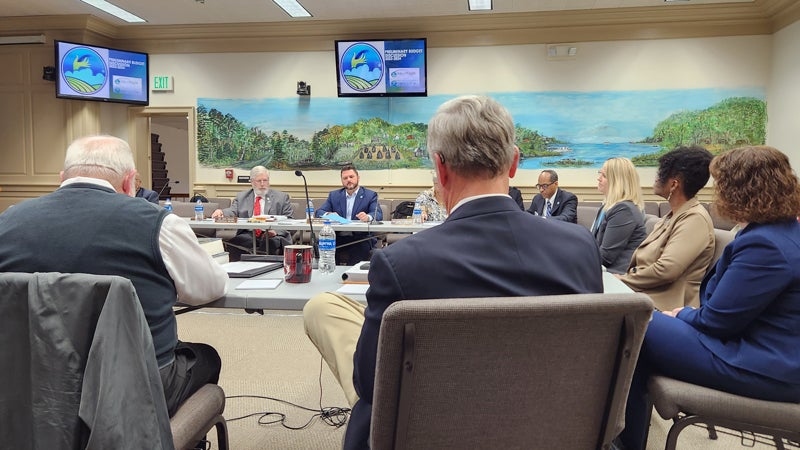IW supervisors to schools: Cut security guards from budget
Published 3:12 pm Monday, March 6, 2023

- Isle of Wight County's supervisors and School Board met jointly on March 2.
Isle of Wight County supervisors have urged schools Superintendent Theo Cramer to cut five security guard positions from his proposed budget.
Cramer’s $81 million 2023-24 budget shows $31.8 million, or 39.2% of the total, coming from county taxpayers, a nearly $5 million increase over what was given this year.
Board of Supervisors Chairman William McCarty said at a March 2 joint meeting of the supervisors and School Board that the budget request would equate to a 10-cent increase in the county’s real estate tax rate.
Currently Isle of Wight charges a real estate tax rate of 85 cents per $100 in assessed value. The rate is lower than any neighboring localities except for Surry County, which charges 72 cents per $100.
On Feb. 21, Cramer’s budget request from the county had totaled $31.4 million, or a $4.6 million increase over last year’s local funding. The roughly $400,000 increase in the nine days since is not being driven by any one expense, but rather is the result of “tweaks across the board,” said school division spokeswoman Lynn Briggs.
Cutting the five security guard positions wouldn’t result in layoffs, as Isle of Wight County Schools presently doesn’t employ any. The five new security positions, which had been included in Cramer’s Feb. 21 presentation, would carry a total cost of $161,281, or roughly 3.2% of the total requested county funds.
Each school already has an Isle of Wight County sheriff’s deputy assigned to it as a school resource officer, or SRO.
SROs returned to Isle of Wight’s five elementary schools in October for the first time in a decade after the Sheriff’s Office received a five-year state grant to pay the salaries and benefits of four new deputies for the nine months they’d be stationed in each school. Isle of Wight County had funded a fifth with local money during the 2022-23 budget process. Prior to October, only the county’s two middle schools and two high schools had an SRO in the building each school day.
Supervisor Joel Acree contended there’d been “silence” from school officials on unarmed school security officers, or SSOs, during last year’s push for SROs.
“What’s changed?” McCarty pressed school officials.
“I was a big advocate for SSOs the day I joined the School Board,” School Board Chairman John Collick countered. “I was the only one.”
Jason Brinkley, a former Isle of Wight County sheriff’s deputy who joined the school system last year in a newly created “security and emergency management specialist” position, said the main difference is that SSOs would report directly to school administrators. SROs, as deputies, report to the Sheriff’s Office.
While an SRO may teach a program on bullying or the dangers of drunk driving, their primary role is to handle criminal matters that arise in the schools, Brinkley said. “We don’t have the authority to ask the sheriff’s deputy to do lunch duty, to do bus duty,” Cramer said.
“Right now our administrators are the ones breaking up the fights,” said Deputy Superintendent Susan Goetz.
Acree balked at the school system calling on administrators rather than each school’s assigned deputy when there’s a fight.
“That’s assault, right?” Acree asked.
Calling an SRO to break up a fight would give them the purview to handle the incident as a criminal matter, Goetz countered. School Board member Denise Tynes added that should a student fighting with another hit an intervening deputy, it could elevate the criminal charges that student would face. Under Virginia law, assault and battery changes from a Class 1 misdemeanor to a Class 6 felony, punishable by a mandatory minimum of six months in jail, if the assault is committed against a law enforcement officer.
“We are talking about children who make poor decisions more often than we would like,” Cramer said.
But McCarty wasn’t sold, asking Cramer to consider removing the requested SSOs from his budget proposal.
McCarty then questioned two “dean of students” positions Cramer had requested. Goetz said the dean positions were also tied to student discipline.
The two positions, one for Smithfield High School and the other for Windsor High School, would carry a cost of $146,000. Cramer told the School Board in February that the goal of the new positions is to handle student discipline and free up principals to focus on pandemic-related learning loss.
“Since the pandemic, discipline has increased greatly,” Goetz told supervisors.
School administrators, rather than spending time overseeing classroom instruction, are “processing discipline all day long.”
The School Board scheduled a public hearing on its proposed budget for March 7. The School Board is slated to vote on Cramer’s budget on March 9. The School Board-approved budget is due to the supervisors by March 31.





